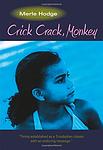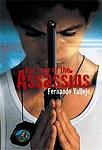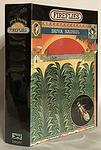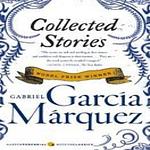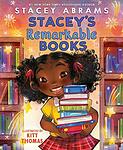The Greatest Trinidadian, Colombian "Fiction" Books Since 1970
Click to learn how this list is calculated.
This list represents a comprehensive and trusted collection of the greatest books. Developed through a specialized algorithm, it brings together 300 'best of' book lists to form a definitive guide to the world's most acclaimed books. For those interested in how these books are chosen, additional details can be found on the rankings page.
Genres
Countries
Date Range
Reading Statistics
Click the button below to see how many of these books you've read!
Download
If you're interested in downloading this list as a CSV file for use in a spreadsheet application, you can easily do so by clicking the button below. Please note that to ensure a manageable file size and faster download, the CSV will include details for only the first 500 books.
Download-
1. Love in the Time of Cholera by Gabriel García Márquez
This novel follows the story of Florentino Ariza and Fermina Daza, who fall passionately in love in their youth. However, Fermina eventually marries a wealthy doctor, leaving Florentino heartbroken. Despite this, Florentino remains devoted to Fermina for over fifty years, patiently waiting for her husband's death to have another chance at her love. The story is set against the backdrop of a cholera epidemic, serving as a metaphor for the transformative power of love and the destructive power of obsession.
-
2. A Bend in the River by V. S. Naipaul
"A Bend in the River" is a novel that follows an Indian man, Salim, who moves from the East Coast of Africa to the heart of the continent to open a store in a small, remote town at a bend in the river. The book explores the changes that occur in the town as it evolves from a sleepy outpost to a bustling city. It also delves into Salim's personal struggles and the challenges he faces in adapting to a rapidly changing society, all set against the backdrop of post-colonial Africa.
-
3. Chronicle of a Death Foretold by Gabriel García Márquez
The novel unfolds as a murder mystery, revealing the planned revenge killing of a young man named Santiago Nasar by the Vicario brothers. They believe Santiago has dishonored their sister, Angela, by taking her virginity before her marriage to another man. Despite the impending murder being common knowledge within the small Colombian town, a series of coincidences and misunderstandings prevent anyone from intervening, leading to Santiago's tragic and foretold demise. The narrative explores themes of honor, fate, and the collective responsibility of a community.
-
4. In a Free State by V. S. Naipaul
"In a Free State" is a collection of three short stories and a prologue and epilogue, portraying the realities of post-colonial life and the struggles of individuals caught between their native culture and the imposed Western values. The narratives span across India, Egypt, Washington D.C., and Africa, each exploring the themes of displacement, identity crisis, and cultural conflict. The book provides a profound examination of the human condition, the concept of freedom, and the complexities of power dynamics in a post-colonial world.
-
5. The Autumn of the Patriarch by Gabriel García Márquez
The novel explores the life of an eternal dictator who has ruled over a Caribbean nation for several decades. The patriarch's oppressive regime is marked by corruption, violence, and absurdity, while his personal life is characterized by loneliness and paranoia. The narrative is a complex, non-linear exploration of power, time, and the dehumanizing effects of political tyranny. The patriarch's death prompts a reflection on his life and reign, revealing a mythical, magical, and horrifying reality.
-
6. Crick Crack, Monkey by Merle Hodge
This novel is a coming-of-age story set in Trinidad, exploring themes of colonialism, identity, and cultural conflict through the eyes of a young girl named Tee. As she navigates the complexities of her Afro-Trinidadian heritage and the imposed British colonial education system, Tee is torn between the warmth and vibrancy of her working-class upbringing with her aunt Tantie and the strict, anglicized environment of her middle-class aunt Beatrice. The narrative delves into the psychological impact of cultural dislocation and the struggle to find a sense of belonging in a society deeply fractured by class and race.
-
7. Guerrillas by V. S. Naipaul
"Guerrillas" is a novel set on a Caribbean island, exploring themes of race, politics, and power. The plot follows a group of characters, including a disillusioned Englishwoman, a struggling black activist, and a charismatic but dangerous mixed-race man who leads a band of guerilla fighters. As the tension and violence escalate, the novel delves into the complexities of post-colonial society and the struggle for identity and self-determination.
-
8. Milkman by Anna Burns
Set during The Troubles in Northern Ireland, this novel follows an unnamed 18-year-old protagonist who is pursued by a powerful, older man known only as the Milkman. Despite her attempts to avoid him and maintain a low profile in her community, rumors spread about their supposed affair, leading to increased scrutiny and isolation. The book explores the protagonist's struggle to maintain her individuality amidst political and social turmoil, while also dealing with the pervasive threat of violence and the power of gossip in a close-knit community.
-
9. The Adventures and Misadventures of Maqroll by Alvaro Mutis
"The Adventures and Misadventures of Maqroll" is a collection of seven novellas that follow the life of Maqroll, a seafarer and adventurer. The stories, set in various locations around the globe, are filled with philosophical musings, poetic language, and vivid descriptions of exotic locales. Maqroll's encounters with a host of characters, from pirates to prostitutes, and his experiences with love, loss, and loneliness, all contribute to a richly textured narrative that explores the human condition and the nature of existence.
-
10. Our Lady of the Assassins by Fernando Vallejo
This novel is a dark and gripping exploration of life in Medellín, Colombia, during the height of the drug wars. The protagonist, a middle-aged writer, returns home after many years abroad, only to find his city ravaged by violence and death. He falls in love with two teenage assassins, who guide him through the underworld of the city, exposing him to the brutal realities of life in a place where human life has lost all value. The story is a bleak commentary on the devastating effects of drug trafficking and political corruption on society.
-
11. Fireflies by Shiva Naipaul
This novel explores the complexities of post-colonial Trinidad through the lens of the protagonist's tumultuous family life and his arranged marriage. Set against a backdrop of societal change and personal disillusionment, the narrative delves into themes of identity, tradition, and the search for meaning in a rapidly transforming world. The protagonist's journey is marked by his struggle to reconcile his ambitions and desires with the expectations placed upon him by his family and community, ultimately presenting a poignant critique of the societal norms and cultural heritage that both bind and divide the characters. Through vivid storytelling and rich character development, the book offers a nuanced examination of the human condition within a specific cultural context.
-
12. Collected Stories by Gabriel García Márquez
"Collected Stories" brings together a diverse array of tales that blend the magical with the mundane in a uniquely evocative manner. The stories traverse a variety of settings and characters, each infused with the author's rich imagination and lyrical prose. Themes of love, violence, and destiny are explored through narratives that often blur the lines between reality and fantasy, capturing the complexities of human experience and emotion. This collection showcases the author's ability to illuminate the extraordinary within the ordinary, making the familiar seem fantastical and the fantastical accessible.
-
13. The Sound Of Things Falling by Juan Gabriel Vásquez
"The Sound Of Things Falling" is a thought-provoking novel that delves into the complex and haunting aftermath of the drug trade in Colombia. Set against the backdrop of a turbulent country, the story follows the lives of two men whose paths intertwine in unexpected ways. Through vivid storytelling and poignant reflections, the book explores themes of memory, guilt, and the lasting impact of violence on individuals and society.
-
14. In The Beginning Was The Sea by Tomás González
The novel follows a disillusioned urban couple who seek to escape the chaos and superficiality of city life by moving to a remote tropical coast in Colombia. Dreaming of a simpler existence and self-sufficiency, they purchase a decrepit estate, but their idealistic venture quickly deteriorates as they face a harsh reality. The couple's relationship strains under the pressures of the unforgiving environment, isolation, and the challenges of their new rural life, leading to a tragic culmination. The story is a profound meditation on the complexities of nature, the fragility of human ambition, and the illusory nature of utopian dreams.
-
15. Changó, The Biggest Badass by Manuel Zapata Olivella
This novel is a vibrant tapestry of African heritage and the diasporic experience, weaving together the rich history, mythology, and spirituality of the African continent with the brutal realities of slavery in the Americas. It follows the life of Changó, a powerful African king and deity in the Yoruba religion, who embodies strength, passion, and the struggle for justice. Through his journey, the narrative explores themes of resistance, cultural identity, and the enduring spirit of African people as they navigate and influence the New World, all while maintaining a connection to their ancestral roots and traditions.
-
16. Strange Pilgrims by Gabriel García Márquez
"Strange Pilgrims" is a collection of twelve short stories that explore the lives of Latin American characters who find themselves in unfamiliar European settings. The tales, infused with magical realism, delve into themes of dislocation, love, death, and the surreal experiences of immigrants. The characters, often caught between their old world and the new, face unexpected situations and encounters that challenge their understanding of reality. The stories weave a tapestry of poignant, strange, and sometimes whimsical narratives that reflect the author's signature style of blending the fantastic with the ordinary.
-
17. The Wine of Astonishment by Earl Lovelace
"The Wine of Astonishment" is a gripping narrative that explores the struggle of a small, rural community in Trinidad during the early 20th century, as they grapple with the effects of colonialism, World War II, and the prohibition of their spiritual practice, the Shouter Baptist faith. The story is told through the eyes of Eva, a strong-willed matriarch, and her husband, Bee, the spiritual leader of the community. The novel examines themes of resilience, faith, and the fight for cultural and religious freedom.
-
18. En Diciembre Llegaban Las Brisas by Marvel Moreno
Set in the Caribbean region of Colombia, the novel weaves a tapestry of stories focusing on the lives of women from different social backgrounds, spanning several decades of the 20th century. It explores themes of love, betrayal, and the oppressive social norms that dictate women's lives. Through a series of interconnected narratives, the book delves into the personal struggles and intimate experiences of its characters, revealing the complex interplay between societal expectations and personal desires. The arrival of the December breezes serves as a metaphor for the winds of change, challenging the status quo and bringing to light the underlying tensions within this traditional society.
-
19. Delirio(premio Alfaguara 2004) by Laura Restrepo
The novel revolves around a man who returns to Bogotá from a business trip only to find his wife has succumbed to an inexplicable bout of madness during his absence. As he seeks to uncover the roots of her delirium, he delves into her past and the dark history of his country, encountering a tapestry of characters from various strata of Colombian society. The narrative weaves together personal and political elements, exploring themes of love, violence, and the impact of the drug trade, ultimately painting a portrait of a society where reality and madness are intertwined.
-
20. Un Beso De Dick by Fernando Molano
"Un Beso de Dick" is a poignant and intimate exploration of young love and self-discovery set in Colombia. The novel follows the life of a teenage boy who grapples with his emerging sexuality and the intense feelings he harbors for another boy. Amidst the backdrop of a conservative society, the protagonist navigates the complexities of friendship, passion, and the search for identity. The narrative delves into the emotional turmoil and the challenges faced by those who dare to defy societal norms, ultimately offering a narrative that is both tender and heart-wrenching as it reveals the transformative power of love and acceptance.
-
21. The Jumbies by Tracey Baptiste
"The Jumbies" is a captivating and enchanting tale that follows the adventures of Corinne La Mer, a brave and curious young girl living on the island of Trinidad. When a mysterious and powerful jumbie threatens her village, Corinne must use her wit and courage to protect her family and friends. With its rich Caribbean folklore and vivid descriptions, this book takes readers on a thrilling journey filled with magic, friendship, and the triumph of good over evil.
-
22. Golden Child by Claire Adam
Set in rural Trinidad, the book tells the story of a family with twin boys, Peter and Paul. Peter is academically gifted, while Paul is considered to be slower due to a complication at birth. When Paul goes missing, their father is faced with a terrible choice that highlights the stark contrasts between his sons. The novel explores themes of family, sacrifice, and the lengths a parent will go to protect their child.
-
23. The Armies by Evelio Rosero
The novel delves into the harrowing experiences of Ismael, an elderly retired teacher in a small Colombian town plagued by political violence. As he navigates the complexities of his daily life, which includes a deep affection for his garden and his wife, the town becomes increasingly engulfed by the chaos of warring factions. The narrative captures the sense of dread and the abruptness of violence as neighbors disappear and the social fabric unravels, revealing the profound impact of conflict on ordinary lives. Ismael's journey becomes a poignant exploration of the human condition amidst the terror of the unseen and the struggle to maintain a semblance of normalcy and dignity in a world falling apart.
-
24. Duermevela by Melba Escobar
"Duermevela" is a compelling narrative that delves into the complexities of human consciousness and the blurred lines between wakefulness and dreaming. The story unfolds through the experiences of its protagonist, who navigates a series of surreal and introspective episodes, challenging the reader's perception of reality. As the character's journey progresses, the novel explores themes of identity, memory, and the subconscious, weaving a tapestry of psychological intrigue that invites contemplation about the nature of our existence and the enigmatic state that exists between sleeping and being awake.
-
25. Los Estratos by Juan Cárdenas
"Los Estratos" is a thought-provoking novel that delves into the complexities of social stratification and personal identity in contemporary Colombia. Through the eyes of its protagonist, a middle-aged man undergoing an existential crisis, the narrative explores themes of class, race, and the search for meaning in a society marked by deep inequalities and historical scars. As he navigates a series of encounters with various individuals from different social layers, the protagonist's introspective journey reveals the fragmented nature of human experience and the elusive quest for self-understanding within the stratified landscape of modern life.
Reading Statistics
Click the button below to see how many of these books you've read!
Download
If you're interested in downloading this list as a CSV file for use in a spreadsheet application, you can easily do so by clicking the button below. Please note that to ensure a manageable file size and faster download, the CSV will include details for only the first 500 books.
Download




